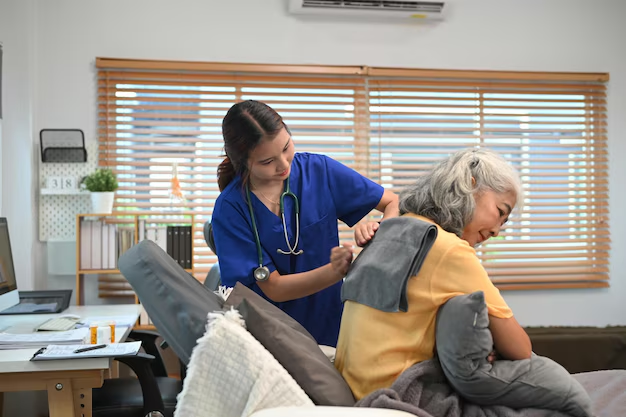Your Guide to What Part Of Medicare Covers In Home Health Care
What You Get:
Free Guide
Free, helpful information about Medicare FAQ and related What Part Of Medicare Covers In Home Health Care topics.
Helpful Information
Get clear and easy-to-understand details about What Part Of Medicare Covers In Home Health Care topics and resources.
Personalized Offers
Answer a few optional questions to receive offers or information related to Medicare FAQ. The survey is optional and not required to access your free guide.
Understanding Medicare Coverage for In-Home Health Care
Navigating the complexities of Medicare can often feel daunting, especially when it comes to understanding which part of this extensive program covers in-home health care. As our loved ones age or manage chronic health issues, in-home health care can provide the necessary medical support in the comfort of familiar surroundings. So, how exactly does Medicare cover these services?
Medicare and In-Home Health Care: What You Need to Know
Medicare, the federal health insurance program primarily for people aged 65 or older, is divided into different parts, each covering specific services. When it comes to in-home health care, it’s crucial to turn your attention primarily to Medicare Part A and Part B.
What Medicare Part A Covers
Medicare Part A, known as hospital insurance, primarily covers inpatient hospital stays, care in a skilled nursing facility, hospice care, and some home health care services. However, Part A is often not the primary contributor for in-home health services unless they follow a hospital stay.
The Role of Medicare Part B
Medicare Part B, or medical insurance, plays a more significant role in covering in-home health care. It provides coverage for essential health services necessary to treat illnesses or injuries. Specifically, Part B covers:
- Skilled nursing care: To qualify, your doctor must certify that you need medically necessary skilled nursing care.
- Physical therapy: This is included under Part B if needed to treat a condition.
- Speech-language pathology services: Covered if they help improve your condition.
- Medical social services: These services include counseling or help finding community resources.
For Medicare to cover in-home health services:
- A doctor must order and certify the need for home health care.
- The patient must be homebound, meaning leaving home requires a significant effort.
- Care must be provided by a Medicare-certified home health agency.
Exclusions and Limitations
While Medicare Part B provides a broad spectrum of services in-home, it doesn't cover 24-hour a day care at home, meals delivered to your home, homemaker services (like shopping or cleaning), or personal care (if that’s the only help the individual needs).
Exploring Financial Assistance and Related Programs
Navigating Medicare’s coverage is just one piece of managing health care costs. Understanding government aid and other financial options can greatly alleviate financial strain.
- Medicaid: For those eligible, Medicaid may cover services not included under Medicare, if the patient meets certain income and asset criteria.
- State Assistance Programs: Some states offer programs to assist with home health care, often supplementing Medicare.
- Financial Counseling: Engaging with a financial counselor could help explore debt relief options or set up payment plans for uncovered services.
- Credit Solutions: Exploring credit card solutions or personal loans designed for medical expenses can provide flexibility in covering upfront costs.
- Local Nonprofits: Some community organizations offer resources or financial aid for seniors needing extra support.
By understanding the intricacies of Medicare and complementing it with various financial options, individuals and families can create a robust support system that ensures quality care without overwhelming financial burdens.
🔍 Financial Assistance & Resources:
- 💠 Medicaid: Additional coverage for low-income individuals
- 📋 State Programs: Supplementary services beyond Medicare
- 💳 Medical Credit Cards: For manageable payment plans
- 🏢 Nonprofit Aid: Community resources for additional support
- 🏦 Financial Counseling: Tailored advice for debt management
What You Get:
Free Medicare FAQ Guide
Free, helpful information about What Part Of Medicare Covers In Home Health Care and related resources.

Helpful Information
Get clear, easy-to-understand details about What Part Of Medicare Covers In Home Health Care topics.

Optional Personalized Offers
Answer a few optional questions to see offers or information related to Medicare FAQ. Participation is not required to get your free guide.


Discover More
- a Medical Provider That Accepts Medicare Assignment Must
- a Medical Provider That Accepts Medicare Assignment Must Quizlet
- a Medicare Patient Received Treatment That Isn't Covered By Medicare
- a Medicare Patient Receives Treatment That Isn't Covered By Medicare
- a Medicare Supplement Basic Benefit Is Quizlet
- a Medicare Supplement Companies
- a Medicare Supplement Policy Is Quizlet
- a Medicare Supplement Policy Must Not Contain Benefits Which
- a Patient Received Treatment In August Medicare
- Am I Eligible For Medicare
